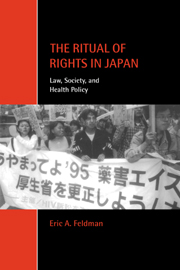Book contents
- Frontmatter
- Contents
- Preface
- Acknowledgments
- 1 Reconsidering rights in Japanese law and society
- 2 Rights in Japanese history
- 3 Patients, rights, and protest in contemporary Japan
- 4 AIDS policy and the politics of rights
- 5 Asserting rights, legislating death
- 6 Litigation and the courts: talking about rights
- 7 A sociolegal perspective on rights in Japan
- Notes
- Bibliography
- Index
5 - Asserting rights, legislating death
Published online by Cambridge University Press: 08 July 2009
- Frontmatter
- Contents
- Preface
- Acknowledgments
- 1 Reconsidering rights in Japanese law and society
- 2 Rights in Japanese history
- 3 Patients, rights, and protest in contemporary Japan
- 4 AIDS policy and the politics of rights
- 5 Asserting rights, legislating death
- 6 Litigation and the courts: talking about rights
- 7 A sociolegal perspective on rights in Japan
- Notes
- Bibliography
- Index
Summary
RIGHTS, BRAIN DEATH, AND ORGAN TRANSPLANTATION
Since Japan's controversial first heart transplant in 1968, conflict about the definition of death has been joined by a diverse group of individuals and organizations. Physicians, attorneys, journalists, philosophers, and political activists have all clashed in the battle over brain death. No single group, and there are many, has been able to attract widespread support for its particular view of what standard of death ought to be applied in Japan's hospitals. Former Prime Minister Kaifu's administration tried to decide the matter through a high-level panel of experts it assembled in 1989, but failed. A transplant bill that was to be introduced in the 1993 Diet session was delayed; when it was introduced in April 1994, it too failed. Finally, after years of struggle, the 1997 Diet passed a law aimed at increasing the number of organ transplants in Japan. But even that legislation did not articulate a uniform definition of death. Fierce opposition to the bill resulted in feeble legislation promoting organ transplantation without endorsing brain death criteria.
Why is it that defining death as brain death remains controversial in Japan? Whether or not a brain death standard is accepted, the vast majority of people will experience death in its conventional form, the termination of heartbeat and breath. For them, death will result from the biological limits of vital functions, whether expedited by disease or the natural result of age.
- Type
- Chapter
- Information
- The Ritual of Rights in JapanLaw, Society, and Health Policy, pp. 82 - 109Publisher: Cambridge University PressPrint publication year: 2000



